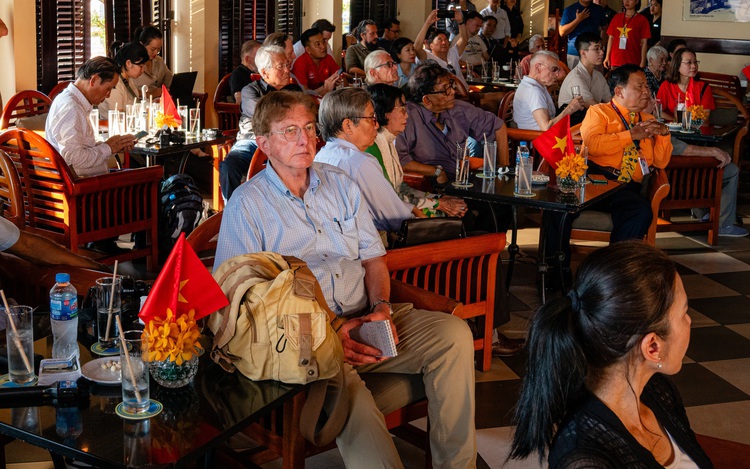
Former journalist David DeVoss returned to Vietnam on the occasion of the 50th anniversary of the country’s reunification. Photo: Ngoc Duc / Tuoi Tre News
Tuoi Tre News' reporter spoke with Jim Laurie and David DeVoss, war correspondents who returned to Vietnam to cover the Doi Moi (Renovation) reforms, to better understand the nation's development through international eyes.
Witnesses to Doi Moi
In spring 1979, Laurie, then an ABC Television correspondent, came back to Vietnam at the invitation of Foreign Minister Nguyen Co Thach.
This was his first return to the country after leaving Saigon in late May 1975, when he was among the last foreign journalists to depart Vietnam.
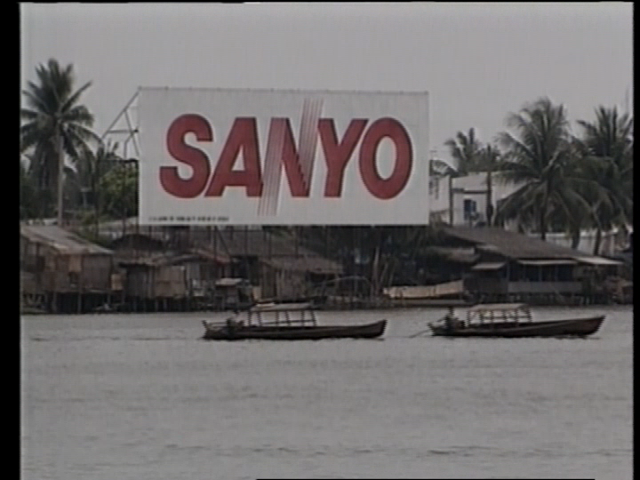
Billboards of multinational companies appearing in Vietnam in the early 1990s broadcast on ABC. Photo: Jim Laurie
"When I came back to Vietnam, it was quite sad, I felt, because the nation was still very much recovering from the war and was very poor," Laurie recalled.
"It was a time in 1979 when Vietnam didn't even have enough rice to feed itself."
During this first return, Laurie traveled from the north to the south and into Cambodia.
In 1979, 1980, and 1985, he repeatedly returned to Vietnam but saw little significant improvement.
"I found people up and down the country in 1985 desperate to make a living any way they could," he recounted in a contemplative tone.
"It was clear by that time that the Hanoi government was going to have to make some reforms if it was going to have any progress in terms of the economy."
Around the same time, DeVoss had similar experiences.
His first return to Vietnam was with a U.S. Congressional delegation visiting Hanoi in the late 1970s.
"It was just the first time I had ever been back since the war and the first time I'd ever been to Hanoi," he told Tuoi Tre News.
He particularly remembered visiting Hai Phong port: "Here is the biggest port in the north, and it's just deserted. It had not been repaired. There was no modern machinery. The people assigned to move cargo off ships were basically using their hands and wheelbarrows and nets to do so. But again, there were a lot of other priorities at that time for Hanoi to deal with."
In the south, apart from Ho Chi Minh City maintaining its basic appearance, the rest had not truly recovered from the war.
"The industries had not been rebuilt in the south," DeVoss observes about the stagnant production at the time.
In 1986, the Sixth Party Congress initiated Doi Moi, marking a historic turning point for Vietnam.
When Laurie got back to Vietnam in the late 1980s, he noticed gradual changes appearing.
However the major breakthrough only came when Vietnam-U.S. relations were normalized in 1995.
"The impact of Doi Moi was gradual, it didn't happen overnight," he said.
"From 1986 to 1995 was a very slow progression.
"But when I came back in 1995, I could really see the differences.
"First of all, Doi Moi was beginning to work.
"Secondly, the Americans finally ended their trade embargo on Vietnam."
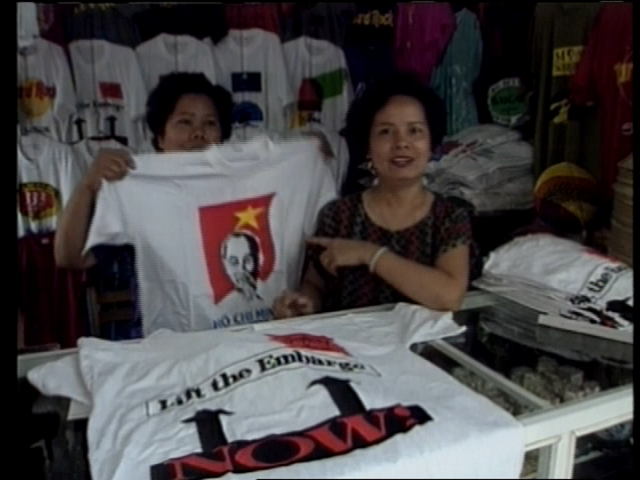
A clothing stall with products calling to 'End the economic embargo.' Photo: Jim Laurie
Despite the long wait, Laurie affirmed he always believed Vietnam would succeed with reform.
The former ABC correspondent recounted the first foreign investment flows into Vietnam: "The new foreign investment law came into effect, and you saw a tremendous amount of companies coming in from Singapore, from Taiwan, from all over Asia. That really propelled the Vietnamese economy with a much more liberal investment environment.
"I remember doing a lot of stories in the late eighties or early nineties about Singaporean firms, Taiwan firms, different international companies coming into Vietnam in the very beginning stage of investment. There was a young American who was one of the earliest investors in Hanoi, before the U.S. Embassy was reopened."
The 'young man' in Laurie's report was James Rockwell, who later helped establish the American Chamber of Commerce in Vietnam (AmCham Vietnam).
Contribution of overseas Vietnamese
Unlike Laurie, DeVoss was not in Vietnam during the early Doi Moi years.
His first return was in 1995 to write about the first wave of returning Vietnamese Americans.
On this return, he noticed many changes.
"The biggest change was in Hanoi," DeVoss recollected.
"Hanoi had really come to life. At the hotels there was entertainment. In the bar restaurant area, it was full of people who were laughing and having fun.
"The streets at night were still not bustling with people, but there were people there, there were sidewalk cafés.
"There were plenty of cyclos that you could make your way around town at night, and there were stage reviews, singing and dancing.
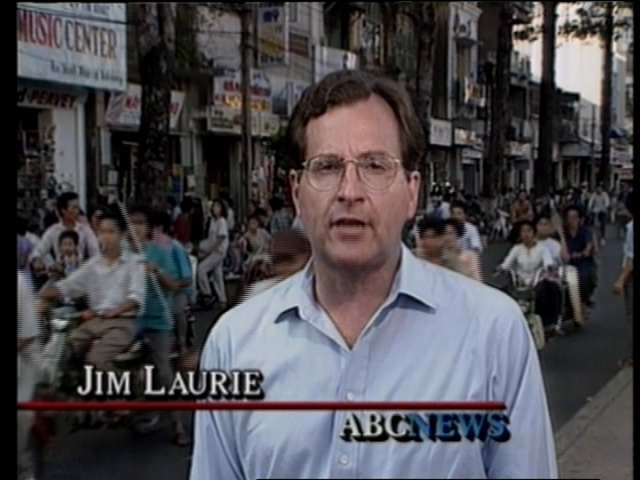
Laurie in a documentary about Doi Moi in Vietnam on ABC. Photo: Jim Laurie
"Things were coming back to life in Ho Chi Minh City, but it was more cautious. Many small businesses were being started by Viet Kieu who had come back from the United States. They were starting agricultural processing and businesses that would take foreign investment because machinery was required to make things work."
However, DeVoss was not surprised by the development Doi Moi brought.
"Even in the depth of the war, it was still very apparent that the Vietnamese were very hardworking, resourceful people," he said.
"You always knew that they were going to recover.
"It was just a question of when that might be and under what circumstances."
Laurie remembered Vietnam's first efforts to attract international tourists in the 1990s.
Vietnam tried to change its image in international eyes through the tourism slogan: "Vietnam is a country, not a wửa."
"It was hard at first, but they developed a more vibrant tourist industry. Back in the old days, it was not easy to get a visa for Vietnam, and then that gradually became easier in the 1990s," he shared.
Both foreign journalists believe one of the most important drivers of Vietnam's post-Doi Moi development came from overseas Vietnamese contributions, including the return wave of Viet Kieu from around the world.
"After 1986, Vietnam began to welcome back into Vietnam the Viet Kieu," Laurie said.
"Many Viet Kieu came back to Vietnam, and they invested there.
"There were a lot of remittances, money coming into Vietnam from the overseas Vietnamese community in the U.S., in Australia, in France.
"This contributed to the development of Vietnam as well."
Recalling the context of his 1995 return to Vietnam, DeVoss confirmed the Vietnamese community in California was deeply divided on this issue.
He described the tense atmosphere: "There was a tremendous debate going on among Vietnamese refugees about how helpful we should be to the new Vietnam. Should we be taking our energies and skills back to Vietnam?"
DeVoss depicted how some debates led to violence.
Despite this, a significant portion of Viet Kieu were determined to return.
"They were going back to help Vietnam," he recalled.
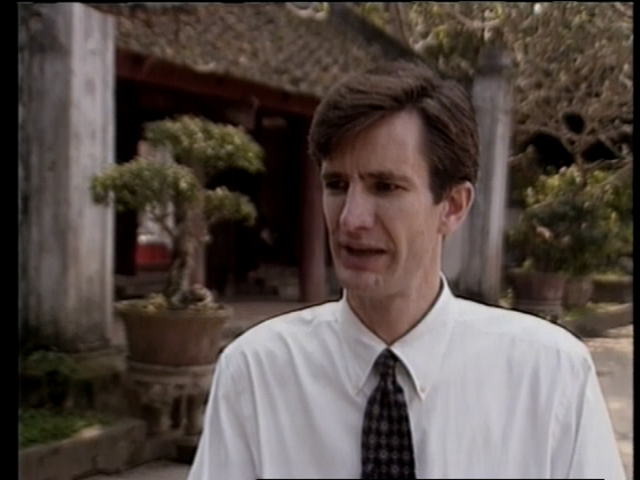
An interview with James Rockwell, one of the first American investors in Vietnam. Photo: Jim Laurie
"Whether it was import-export business or commercial business, there were a couple of agricultural ventures... in all of these ventures they were bringing investment capital.
"And they all thought, yeah, they were doing this as an investment, but it was an investment in their own country that they had left, but they were hoping to return.
"And most of them did, actually."
After many years, when pioneering Viet Kieu had achieved brilliant success, community sentiment fundamentally changed.
"I don't hear any negativity at all about Saigon and South Vietnam," DeVoss joked.
"Nobody gets shot anymore by proposing that we go back to Vietnam and start a business because the perception here is that things are already improved.
"All of this wouldn't have happened without Doi Moi."
Optimistic about Vietnam's future
Looking back at nearly 40 years of Doi Moi, both veteran journalists expressed admiration for Vietnam's achievements.
Laurie, who just visited Vietnam for the 50th anniversary of national reunification in April, cannot hide his impression of Vietnamese development since Doi Moi.
"It's extraordinary today," he remarked.
"The reforms continue.
"They haven't stopped, and it wasn't all one reform.
"There have been a whole series of reforms over the last 30 years.
"Today, of course, bears no resemblance when I visit Vietnam to what I saw in the '70s, '80s, and '90s. It's so very different."
The former ABC reporter was particularly impressed with technological development.
"When I was in Vietnam in May, I visited the Saigon Hi-Tech Park and the Vietnam National University-Ho Chi Minh City," he said.
"I was just very impressed with them.
"There's so much going on in the tech field.
"I wouldn't be a bit surprised if, in a few years, Vietnam becomes competitive with China in terms of AI and things of that sort.
"It's just a very exciting time right now to be in Vietnam."
DeVoss, after his most recent visit, also made a strong assessment when comparing Vietnam with all the post-war stories from conflict zones he has covered in his 50-year career.
"Saigon - Ho Chi Minh City is the most robust recovery that I have seen," he stated.
After nearly half a century of connection and following Vietnam, both journalists expressed strong faith in the Southeast Asian country's future.
"Vietnam is at the dawn of a new day," DeVoss said.
"The sun can only rise higher.
"I'm very optimistic about Vietnam's future.
"When you look at where Vietnam came from and where it is today, nothing can stop this development process.
"This is truly a rare success story in the post-conflict world."
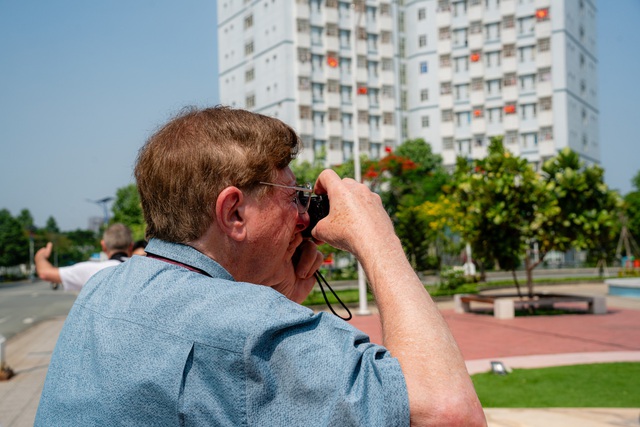
DeVoss takes documentary photos while visiting Vietnam National University-Ho Chi Minh City during his return to Vietnam in April 2025. Photo: Ngoc Duc / Tuoi Tre
"With the industriousness of the people, their desire to learn and develop, I believe Vietnam can absolutely achieve its goal of becoming a developed country in the next 20 years," Laurie concluded.
The two former war correspondents, who witnessed Vietnam in its most painful days, have now become enthusiastic witnesses to the country's extraordinary rise.
Their story is not just a reminder from the past, but a message of hope for the future. a future where Vietnam can proudly stand shoulder to shoulder with developed nations.
Advice for Vietnam
DeVoss emphasized the importance of intellectual exchange, proposing to learn from the model China successfully implemented of establishing cooperative centers at major universities.
According to him, establishing cooperative centers at major universities for professor exchanges, business exchanges, and idea exchanges would be particularly useful.
Such centers could arrange tours and make introductions, connecting people.
Additionally, DeVoss saw great opportunities for Vietnam in the film industry: "A lot of that activity could be moved to Vietnam once it builds the facilities. This happened before. The American-made war movies about the Resistance War against America were made in the Philippines, and the Philippines got all that money."
The opportunity for Vietnam is enormous as the film industry trends toward moving away from Hollywood.
"The film business is leaving Los Angeles because of the tax burden here and the regulation," he said.
"At first it went up to Canada, and now a lot of the filming is done in Great Britain.
"It could very easily move to Vietnam once it builds the facilities.
"This is the time for Vietnam to say: 'Have it all come to us. We can handle it'.
"There's no reason Vietnam cannot continue to succeed and attract more investment.
"Americans today are quite willing to invest in Vietnam.
"American investors have confidence in Vietnam.
"Vietnam should take advantage of that."
Laurie agreed about Vietnam's unique position: "With its geostrategic position and skillful foreign policy, Vietnam can attract investment from many different sources without depending too much on any one partner."


Max: 1500 characters
There are no comments yet. Be the first to comment.